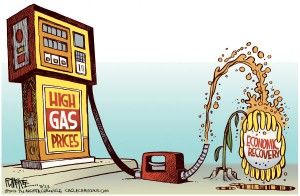Dems stop bills to ease gas price hike
by Dave Roberts | August 26, 2014 4:38 pm
 Perhaps the last chance to head off a California gasoline price hike that could exceed 50 cents per gallon by 2020 just was defeated on the state Senate floor.
Perhaps the last chance to head off a California gasoline price hike that could exceed 50 cents per gallon by 2020 just was defeated on the state Senate floor.
Sen. Andy Vidak[1], R-Hanford, offered amendments to a bill, AB2492[2], that had nothing to do with the bill’s focus on drug sentencing. The amendments duplicated those in Vidak’s bill, SB1079[3], which would head off a gas price hike that could begin next year.
“I rise today to offer amendments that will stop a hike in gasoline and diesel prices that could range anywhere from 16 to 76 cents a gallon every time Californians fill up Jan. 1, 2015,” Vidak said on the Senate floor Aug. 21. “Gasoline is not a luxury for most Californians, it’s a necessity.
“Communities that I represent already suffer extreme poverty and some of the highest unemployment in the state as well as the country. Our food banks are already overwhelmed with families waiting in food lines. And they’re not able to make it right now. This is an unfair, hidden, regressive tax that will hurt many vulnerable Californians, and it must be stopped.”
The amendments were promptly voted down by the Senate’s Democratic majority, 23-10, without discussion.
Exemption
 SB1079 would exempt the transportation fuel industry from having to comply with the state’s cap-and-trade program[4], which the industry is scheduled to do beginning Jan. 1, 2015. That program was started to advance compliance with AB32, the California Global Warming Solutions Act of 2006[5], which was signed into law by then-Gov. Arnold Schwarzenegger. The program requires the state’s largest energy users to reduce their carbon emissions or purchase carbon allowances through the cap-and-trade market mechanism.
SB1079 would exempt the transportation fuel industry from having to comply with the state’s cap-and-trade program[4], which the industry is scheduled to do beginning Jan. 1, 2015. That program was started to advance compliance with AB32, the California Global Warming Solutions Act of 2006[5], which was signed into law by then-Gov. Arnold Schwarzenegger. The program requires the state’s largest energy users to reduce their carbon emissions or purchase carbon allowances through the cap-and-trade market mechanism.
“The State Air Resources Board’s regulatory analysis for the market-based compliance mechanism anticipates carbon allowance costs ranging from $15 to $75, inclusive, per ton between 2015 and 2020,” the bill states.
“Many areas of the state continue to struggle from disproportionately high unemployment rates, and the state’s hard-working low-income and middle-income families will likely suffer most from this additional cost burden.”
The bill exempts from the cap-and-trade program any industries not enrolled in it by Dec. 31, 2014.
“This act is an urgency statute necessary for the immediate preservation of the public peace, health, or safety within the meaning of Article IV of the Constitution and shall go into immediate effect,” the bill states.
“The facts constituting the necessity are: To allow sufficient lead time to make necessary adjustments to the program before it takes effect January 1, 2015, it is necessary for this act to take effect immediately.”
Stuck
Despite the bill’s call for urgency, SB1079 is bottled up – Vidak calls it “stuck” – having been sent to the Senate Rules Committee.
“Liberal elites don’t seem to care about poor people who have to wait in food lines to feed their family,” said Vidak in a press release[6] response to the rejection of his amendments. “Even a small increase in gas prices will be devastating to so many people in our Valley.”
Vidak goes on to charge that “the California Air Resources Board and the Brown administration secretly created the unauthorized gas tax without public knowledge or legislative approval. California already has the highest gas prices in the nation. According to GasBuddy.com, the average cost for gasoline in California is $4.12 per gallon and the national average is $3.68.”
A similar bill, AB69[7], by Assemblyman Henry Perea[8], D-Fresno, provides a three-year exemption for the transportation fuel industry until 2018. It has been assigned to the Assembly Rules Committee.
High gas prices
No one knows exactly how high gas prices might increase as a result of bringing transportation fuels into the cap-and-trade mandate. It will depend on how high the price of a carbon allowance goes. Currently at $11.34 per ton, it’s expected to grow by 5 percent plus inflation per year as the carbon allowance noose tightens.
By 2020, gas prices will likely increase in the range of 13-20 cents per gallon, but could exceed 50 cents per gallon, according to a letter[9] to Perea from the Legislative Analyst’s Office[10]. The estimate is based on gas prices increasing 8-9 cents per gallon for every $10 per ton of carbon allowance cost.
“The actual price increase will depend on a wide variety of economic, technological, and regulatory factors that are difficult to predict,” the LAO letter acknowledges. “We note that if transportation fuels were not part of the cap-and-trade program, alternative policies to meet the AB 32 emissions targets might be adopted that also have the effect of increasing gasoline prices.”
Price study
The estimate of a 13-20 cent per gallon gas price rise is based on a June 2014 study[11] conducted for the California Air Resources Board[12] by the Market Simulation Group[13]. It’s based on a 2020 allowance price of $20 per ton. But the study also states that allowance prices could go as high as $79 per ton, shooting gas prices up more than 50 cents per gallon.
“This study’s scope is narrower than the others we reviewed, but our summary places very heavy weight on it due to its timing and methodological credibility,” the LAO letter states.
The other cost studies that the LAO looked at are not far off from the Market Simulation Group report.
A 2012 study[14] by the Boston Consulting Group[15] estimated that gas prices could increase 15-77 cents per gallon in 2020 (in 2013 dollars). The amount could be 17-87 cents per gallon in projected 2020 dollars, according to the LAO.
A 2010 study[16] for the Union of Concerned Scientists estimated gas prices increasing 37 cents per gallon in a “conservative case” and 88 cents per gallon in an “extreme case.”
An 88-cent gas price hike would likely push California gas prices over $5 per gallon. And that concerns Perea, who defended his three-year moratorium bill in a press release[17].
“The cap-and-trade system should not be used to raise billions of dollars in new state funds at the expense of consumers who are struggling to get back on their feet after the recession,” he said. “In some areas of the state, like the Central Valley, constituents need to drive long distances and they will be disproportionately impacted by rising gas prices.”
‘Much larger’
Perea believes gas prices will increase about 15 cents per gallon, but cautioned that “a much larger jump is possible. Delaying fuels from coming under the cap would allow California consumers to prepare for the potential impacts of higher gas prices.”
The pain at the pump will be felt not only by residents, but by businesses, warned John Kabateck, executive director of the National Federation of Independent Business/CA[18].
“California’s small businesses and consumers face significant economic harm from fuel price increases coming Jan. 1, but state officials have done nothing to inform them this is coming,” Kabateck said. “A reasonable delay to this policy will give the state time to fully analyze the impacts of bringing fuels under the cap and small businesses and families time to budget for this financial hit.”
Transportation businesses will likely be hardest hit by the gas price hike.
“Moving fuels under the cap-and-trade program could stifle the economic recovery in the state and give out-of-state businesses a competitive advantage,” said Mike Kelton, CEO of Inland Star Distribution[19] in Fresno.
“While we must work to reduce the consumption and dependency on gasoline and diesel to reduce our greenhouse gas emissions, another new gas tax is the wrong way to go about it. The bipartisan support to delay the new hidden gas tax shows the importance to review the impacts of the policy created by regulators at the Air Resources Board.”
$2 billion hit
The probability that SB1079 and AB69 will not be voted on in this legislative session has drawn scorn from Sacramento Bee columnist Dan Walters. He estimates that a 15-cent gas price hike would translate into a $2 billion hit to Californian motorists, with many paying more than $100 extra annually to fill up.
“Given the heavy financial impact of placing fuel under the cap-and-trade program, it should face legislative scrutiny and direct up-or-down votes, rather than being imposed by an unelected board,” wrote Walters in his column, “Legislature ducking debate on big fuel price hike[20].”
“Were AB69 to die without even a hearing, it would be another example of how the Legislature has cravenly ceded its policymaking duties to others, whether they be initiative sponsors, judges or bureaucrats.”
- Sen. Andy Vidak: http://district16.cssrc.us/
- AB2492: http://www.leginfo.ca.gov/pub/13-14/bill/asm/ab_2451-2500/ab_2492_bill_20140528_amended_asm_v98.htm
- SB1079: http://leginfo.legislature.ca.gov/faces/billNavClient.xhtml
- cap-and-trade program: http://www.arb.ca.gov/cc/capandtrade/capandtrade.htm
- the California Global Warming Solutions Act of 2006: http://www.arb.ca.gov/cc/ab32/ab32.htm
- press release: http://district16.cssrc.us/content/democrat-leaders-kill-vidaks-effort-stop-hidden-gas-tax-0
- AB69: http://www.leginfo.ca.gov/pub/13-14/bill/asm/ab_0051-0100/ab_69_bill_20140702_amended_sen_v94.htm
- Assemblyman Henry Perea: http://asmdc.org/members/a31/
- a letter: http://lao.ca.gov/Letters/2014/Perea-Gasoline-Cap-and-Trade-080414.pdf
- Legislative Analyst’s Office: http://lao.ca.gov/
- June 2014 study: http://www.arb.ca.gov/cc/capandtrade/simulationgroup/msg_final_v25.pdf
- California Air Resources Board: http://www.arb.ca.gov/homepage.htm
- Market Simulation Group: http://www.arb.ca.gov/cc/capandtrade/simulationgroup/simulationgroup.htm
- 2012 study: http://cafuelfacts.com/wp-content/uploads/2012/07/BCG_report.pdf
- Boston Consulting Group: http://www.bcg.com/
- 2010 study: http://www.ucsusa.org/assets/documents/global_warming/AB-32-Small-Biz-Study-San-Diego-Report.pdf
- press release: http://asmdc.org/members/a31/news-room/press-releases/perea-introduces-legislation-to-keep-gas-prices-down
- National Federation of Independent Business/CA: http://www.nfib.com/california/
- Inland Star Distribution: http://www.inlandstar.com/
- Legislature ducking debate on big fuel price hike: http://www.sacbee.com/2014/08/07/6613685/dan-walters-legislature-ducking.html
Source URL: https://calwatchdog.com/2014/08/26/dems-bottle-up-bills-to-ease-gas-price-hike/